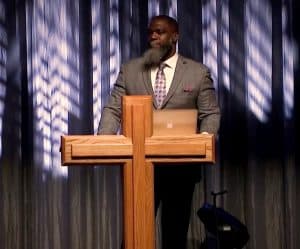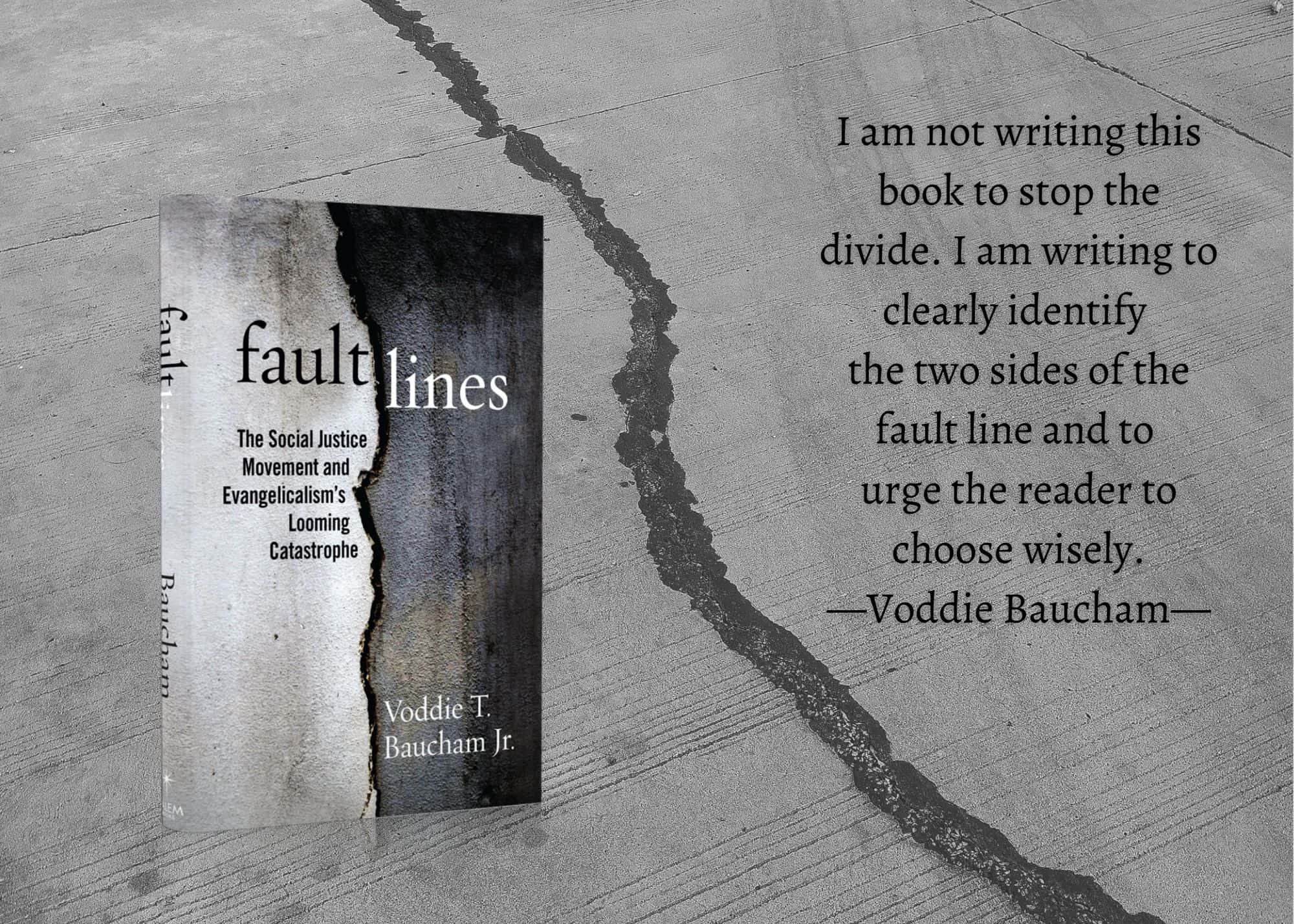It is better to be divided by truth than to be united in error.
—Adrian Rogers—
An abbreviated version of this review is available here.
Overview: A new book by Voddie Baucham, Fault Lines: The Social Justice Movement and Evangelicalism’s Looming Catastrophe, will be released on Tuesday, April 6, 2021. Having pre-ordered the book and joined the Fault Lines Launch Team (also go here), I received an advance copy in the form of a PDF file and have read it. I review the book in this article, but readers should be aware that I also cite some of my own work on the social justice movement and critical race theory (CRT). In this article, the page numbers I cite in parentheses refer to the page numbers in Fault Lines.
This book is a game-changer. It is must reading for all believers, including those who know a great deal about the social justice movement and those who know only a little. The fault lines brought about by the critical social justice (CSJ) movement are becoming increasingly visible, and you, dear reader, will be on one side of the rift or the other. Voddie is correct. A catastrophe is coming to the evangelical church. This book tells you what you need to know to wisely choose a side.
Voddie Baucham has done the church and the world a tremendous service at a critical time. Seeing an ever-widening split on the horizon as the CSJ movement intensifies, especially within evangelicalism, Dr. Baucham has written a new book: Fault Lines: The Social Justice Movement and Evangelicalism’s Looming Catastrophe.1 He, along with many others,2 believes the social justice movement is a false religion that stands in opposition to the authentic gospel of Christ. Baucham writes,
Those belonging to the social-justice crowd present themselves as the only ones pursuing justice, to the exclusion of all who disagree with their assessments—who by that definition, are pursuing injustice.
Perhaps the most troubling aspect of the current struggle is that it mischaracterizes Christians that way too. On one side are “compassionate” Christians who are “concerned about justice.” On the other are “insensitive” Christians who are “not concerned about justice.” This is wrong.
I have pursued justice my entire Christian life. Yet I am about as “anti-social justice” as they come—not because I have abandoned my obligation to “strive for peace with everyone, and for the holiness without which no one will see the Lord” (Hebrews 12:14), but because I believe the current concept of social justice is incompatible with biblical Christianity.
This is the main fault line at the root of the current debate—the epicenter of the Big One that, the it finally shifts with all its force, threatens to split evangelicalism right down the middle. Our problem is a lack of clarity and charity in our debate over the place, priority, practice, and definition of justice (page 5).
I share Voddie’s concern and for some time have sounded numerous warnings about the social justice movement. I try to be an astute observer, but Voddie Baucham is an authority on this subject. I cannot think of anyone better qualified to help the church gain understanding and clarity on this important issue at this critical moment. Voddie speaks charitably and lovingly, but he does not sugarcoat the crisis that is looming before the church. Voddie speaks prophetically. He is a truth-teller. He believes “the current concept of social justice is incompatible with biblical Christianity.” In Fault Lines, he explains how and why.
Systemic Racism?
Is racism systemic in America? Are white people guilty of racism, even without being aware of it? Do they habitually and blindly oppress blacks through institutions and traditions in order to maintain their positions of power and influence over people of color? Are blacks oppressed by a culture that is infused with “whiteness”? The CSJ movement answers each of these questions with an unequivocal yes.

As I’ve previously written, this movement does not see people as individuals, but groups (a fact I learned from a presentation given by none other than Dr. Baucham. Also go here.) CSJ advocates say that primarily two groups exist—oppressors and the oppressed, or victims. If you are white, you are a member of the oppressor group, and if you are black or a member of another minority, you are a member of the oppressed group. No exceptions. Whites who are poor and whites who have friends who are black still are oppressors. They are racists. Blacks who are wealthy, as well as blacks who are poor or wealthy but who harbor no ill will toward anyone who is white, still are oppressed.

Why? America has a history of white supremacy and racism, say CSJ advocates, and it will take a massive effort to dislodge it, if it can be dislodged at all. Just look at America’s past, they say: slavery, lynchings, and Jim Crow. How does a nation overcome all of that? It can’t, they tell us, unless and until whites repent of their “whiteness.” How deeply is whiteness entrenched? Here’s an indication of their beliefs. Martin Luther King, Jr. was murdered in cold blood in 1968—over fifty years ago—and evangelical leader and social justice warrior Thabiti Anyabwile wants whites to start to confront their racism “by at least saying their parents and grandparents and this country are complicit in murdering a man who only preached love and justice” (emphasis added). He also wants reparations for slavery.
Never mind that King’s assassin was James Earl Ray. With regard to slavery, never mind that not every white southerner was a slaveowner. Never mind that some southerners fought in the Union Army. Never mind that certain black families arrived in the United States after the Civil War. Never mind that one of the wealthiest slaveholders in South Carolina was black. And yes, other free blacks who owned slaves existed as well. Further, never mind that blacks are among the recipients of various welfare programs already in place. In this video, podcaster and historian Jon Harris does a great job describing just how complicated arriving at a formula for reparations would be.
Blacks are not inferior, but the assumption that they have to have government help implies that they are.
That’s not all. Especially in light of all the progress that has been made in America in the area of race relations (progress CSJ advocates totally ignore), it is insulting to blacks to assume they can’t get ahead without government assistance, whether it be in the form of welfare, reparations, or some other transfer payment. Blacks are not inferior, but the assumption that they have to have government help implies that they are. It reflects a racist perspective.
What About Events Social Justice Warriors Point to as Evidence of Racism?
But doesn’t the recent spate of police shootings of black suspects, and their deaths, prove that police are targeting blacks and that America is systemically racist? Actually, no. See quote 5 from Fault Lines on this page. That quote represents only a small portion of the discussion Baucham brings to the table about these police shootings. He examines the specifics of several of them, as well as the misinformation and the narrative that has landed front-and-center in the reporting of these events. His findings are eye-opening and compelling. They pull back the curtain that has hidden the CSJ agenda and the truth from the public at large and from evangelicals in particular. Writes Baucham, “I reject the idea that America is ‘characterized by racism,’ or that racism is an unavoidable byproduct of our national DNA. In fact, I believe America is one of the least racist countries in the world” (page 201).
I reject the idea that America is “characterized by racism,” or that racism is an unavoidable byproduct of our national DNA. In fact, I believe America is one of the least racist countries in the world.
—Voddie Baucham—
While only a tiny, tiny fraction of Americans are not against racism, a movement called antiracism is embedded in the fabric of the CSJ movement, and it has become America’s new religion. In fact, contends Baucham, it qualifies as a cult. It’s a twisted belief system that seeks to redefine the word racism, recasting the term so it no longer refers to an individual belief that a person’s skin color determines or heavily influences the worth, or the superiority or inferiority of that individual in relation to others. Instead, antiracists see racism as an institutional and cultural quality that influences and even determines (however covertly) whites’ negative attitudes and oppressive actions toward people of color. Whites hold these attitudes and act upon them, say CSJ advocates, to maintain their positions of power, oppression, and advantage over minorities, especially blacks (pages 81-82).
Never-ending Bondage for Whites, Perpetual Bitterness for Blacks
Writes Baucham, “Antiracism offers no salvation—only perpetual penance in an effort to battle an incurable disease” (p. 67). Although there are others, this is one trait that I believe glaringly demonstrates that the social justice movement and Christianity are two very different worldviews, and thoroughly incompatible.
The religion of “antiracism offers no salvation—only perpetual penance in an effort to battle an incurable disease.”
—Voddie Baucham—
Despite this, many evangelicals, both white and black, have bought into the deceptions of antiracism and critical race theory (CRT), ideologies that are part and parcel of the social justice movement. Matthew Hall is Provost at the Southern Baptist Theological Seminary in Louisville, Kentucky. He has said this:
I am a racist. If you think the worst thing somebody can call you is a racist then you’re not thinking biblically.…I am going to struggle with racism and white supremacy until the day I die and get my glorified body and a completely renewed and sanctified mind because I am immersed in a culture where I benefit from racism all the time (page 80).

Albert Mohler, president of Southern Seminary, has made statements that echo these same ideas. Hear Dr. Mohler.

I believe in being contrite and humble. I believe in acknowledging human imperfection and frailty. I believe in confessing one’s sins to God and, in appropriate contexts, to the people whom one has wronged. Yet we have a big problem here. Both Matthew Hall’s and Al Mohler’s statements affirm ideas that stand contrary to the sufficiency of Christ to completely remove sinful stains.
CRT is not merely an analytical tool as the Southern Baptist Convention’s Resolution 9, passed in 2019, contends. It is a worldview. (Dr. Baucham discusses Resolution 9 at length in chapter 7 of Fault Lines, on pages 138-149.) CRT and critical social justice do not represent the true, liberating gospel of Christ. In fact, they distort it. Here’s what the Bible says in Psalm 103:11-12.
11 For as the heavens are high above the earth,
So great is His mercy toward those who fear Him;
12 As far as the east is from the west,
So far has He removed our transgressions from us.
First John 1:7-9 tells us,
7 [I]f we walk in the light as He is in the light, we have fellowship with one another, and the blood of Jesus Christ His Son cleanses us from all sin.
8 If we say that we have no sin, we deceive ourselves, and the truth is not in us. 9 If we confess our sins, He is faithful and just to forgive us our sins and to cleanse us from all unrighteousness.

We must never claim we have no sin; but coming to Christ for removal of the stain of sin is not a claim to be sinless! It is an admission of guilt, guilt that Christ’s blood is totally sufficient to remove. Will we still struggle with sin? Yes, but when we fail, we confess; and we continually rely on the blood of Christ to remove an otherwise permanent stain.
By contrast, CRT sends white Christians on a hopeless quest for forgiveness and reconciliation they never will attain. CRT offers no relief, no forgiveness. On the other hand, biblical Christianity is liberating. We need to heed the warning Paul originally wrote to the Galatian Christians in Galatians 5:1: “Stand fast therefore in the liberty by which Christ has made us free, and do not be entangled again with a yoke of bondage.”
Remarkably, the good news doesn’t end with God’s delivering believers from heavy bondage. He not only forgives and liberates when we come to Him on His conditions; He also unites those who were once at odds with one another. Paul wrote to the Ephesian Christians, and he writes to us,
11 Therefore remember that you, once Gentiles in the flesh—who are called Uncircumcision by what is called the Circumcision made in the flesh by hands— 12 that at that time you were without Christ, being aliens from the commonwealth of Israel and strangers from the covenants of promise, having no hope and without God in the world. 13 But now in Christ Jesus you who once were far off have been brought near by the blood of Christ.
14 For He Himself is our peace, who has made both one, and has broken down the middle wall of separation, 15 having abolished in His flesh the enmity, that is, the law of commandments contained in ordinances, so as to create in Himself one new man from the two, thus making peace, 16 and that He might reconcile them both to God in one body through the cross, thereby putting to death the enmity. 17 And He came and preached peace to you who were afar off and to those who were near. 18 For through Him we both have access by one Spirit to the Father (Eph. 2:11-18).
Here’s what Paul wrote to the Colossian believers in Colossians 3:8-11:
8 But now you yourselves are to put off all these: anger, wrath, malice, blasphemy, filthy language out of your mouth. 9 Do not lie to one another, since you have put off the old man with his deeds, 10 and have put on the new man who is renewed in knowledge according to the image of Him who created him, 11 where there is neither Greek nor Jew, circumcised nor uncircumcised, barbarian, Scythian, slave nor free, but Christ is all and in all.
And in Galatians 3:26-28, we read,
26 For you are all sons of God through faith in Christ Jesus. 27 For as many of you as were baptized into Christ have put on Christ. 28 There is neither Jew nor Greek, there is neither slave nor free, there is neither male nor female; for you are all one in Christ Jesus.
A Spiritual Atomic Bomb
There’s more. Scripture declares that coveting and stealing are wrong, but the CSJ movement breeds envy, bitterness, and an entitlement mentality in the minds and hearts of black Christians. It tells them they deserve the money and goods that whites have supposedly gained by oppressing them. In turn, whites, even those who have had harbored no ill will toward blacks, are either made to feel guilty for their “whiteness” or incited to feel bitterness toward blacks for feeling entitled.
Christianity, by contrast, does not perpetuate a victim mentality; because in Christianity, Jesus is the only true victim. CRT and CSJ do not encourage blacks to forgive any real or perceived wrongs committed against them by whites, but to demand, in Voddie’s words, “perpetual penance.” Read Dr. Baucham’s statement again: “Antiracism offers no salvation—only perpetual penance in an effort to battle an incurable disease” (p. 67).

Jesus warned multiple times about the consequences of a failure to forgive (see Matt. 6:9-15; 18:21-35; Mark 11:25-26). Certainly this should compel every follower of Christ to forgive, but we need to understand that forgiveness doesn’t just free the person who has committed wrongs; it liberates the one who forgives! Louis Zamperini’s life story affirms this, as does Corrie Ten Boom’s.
Many other lives affirm this as well, but hear me carefully here. Another individual liberated by forgiveness is Voddie Baucham! Near the end of his book, Voddie effectively drops a spiritual atomic bomb on the CSJ movement and destroys it completely. What is this weapon that so effectively obliterates lies, hatred, bitterness, and misunderstanding; and that demonstrates the overwhelming power of the love of Christ and the gospel? It is forgiveness! CRT divides, but the gospel, faithfully appropriated and applied, unites! It accomplishes what otherwise would be impossible!
Don’t Miss the Big Picture: They’re Targeting Christianity
This is a time when the Church of Jesus Christ must speak with clarity and conviction, standing solidly on biblical truth and the gospel. The need is urgent. Many are deceived. The godless proponents of CRT (not the well-meaning advocates of this worldview both inside and outside the church) are seeking to use the teachings of social justice ideology to increase bitterness and animosity between blacks and whites in order to accomplish their Marxist goals. Take note! The fact that CRT has infiltrated the church makes them overjoyed, because they see the church and Christianity as the ultimate oppressors (page 207). Mark it down. Stand solidly on the truth and don’t play along!
Fault Lines will give you discernment that will help you avoid being sucked in.
Fault Lines will be released on April 6. Purchase options are available at this link.
An abbreviated version of this review is available here. A PDF file of the abbreviated review is available here.
Recommended reading: “Eight Big Reasons Critical Race Theory Is Terrible for Dealing with Racism” by James Lindsay
Copyright © 2021 by B. Nathaniel Sullivan. All rights reserved.
Unless otherwise indicated, Scripture has been taken from the New King James Version®. Copyright © 1982 by Thomas Nelson, Inc. Used by permission. All rights reserved.
1Fault Lines: The Social Justice Movement and Evangelicalism’s Looming Catastrophe, (Salem Books: Washington, DC, 2021).
2 Carol Swain is among those who see the social justice movement and critical race theory as does Voddie Baucham. She writes,
When I look out on the horizon, I view race relations from the perspective of a black woman who believes in God’s providence and the prospect of racial reconciliation that comes from forgiveness and the application of New Testament principles. It is time for us to rediscover the Golden Rule (to do unto others as you would have them do unto you). I believe this would go a long way toward bringing understanding to people of goodwill regardless of their race or religious background.…
According to the [critical race theory and social justice] narrative, all white Americans are guilty oppressors who have benefitted from membership in a race we know they did not get to choose. Once the oppressor label is accepted and internalized, a deadly silencing and shaming takes place. The shamed oppressor is not allowed to engage in a conversation with accusers. At younger and younger ages, our children are being taught to suck it up. There is nothing to absolve one from collective guilt or permanent victimhood. How very sad! But it is not too late for us to choose unity over division.


Be First to Comment